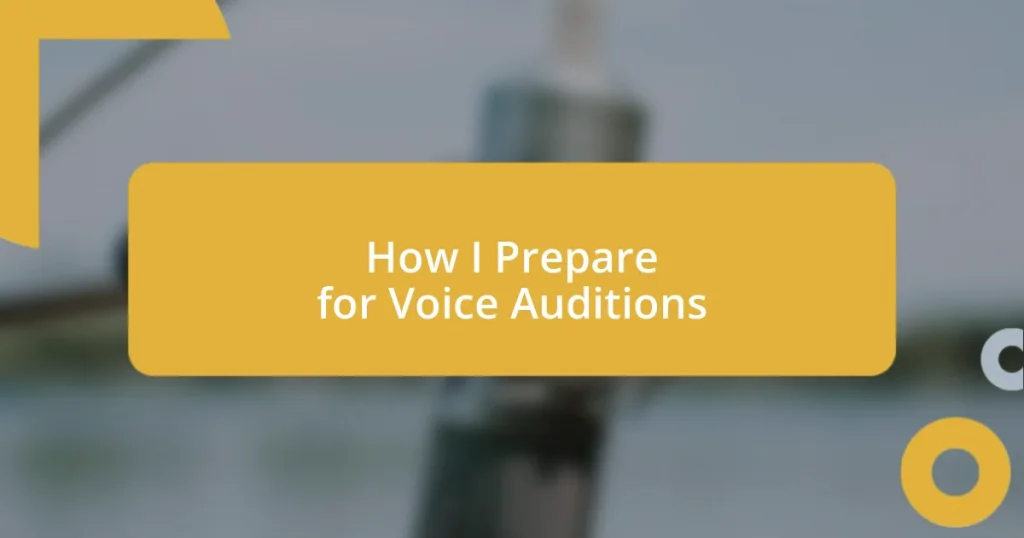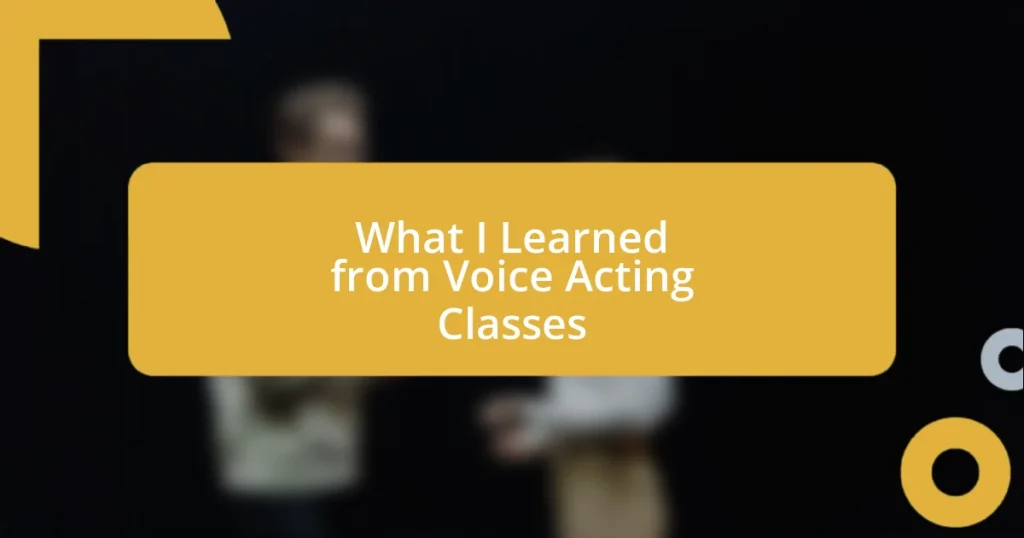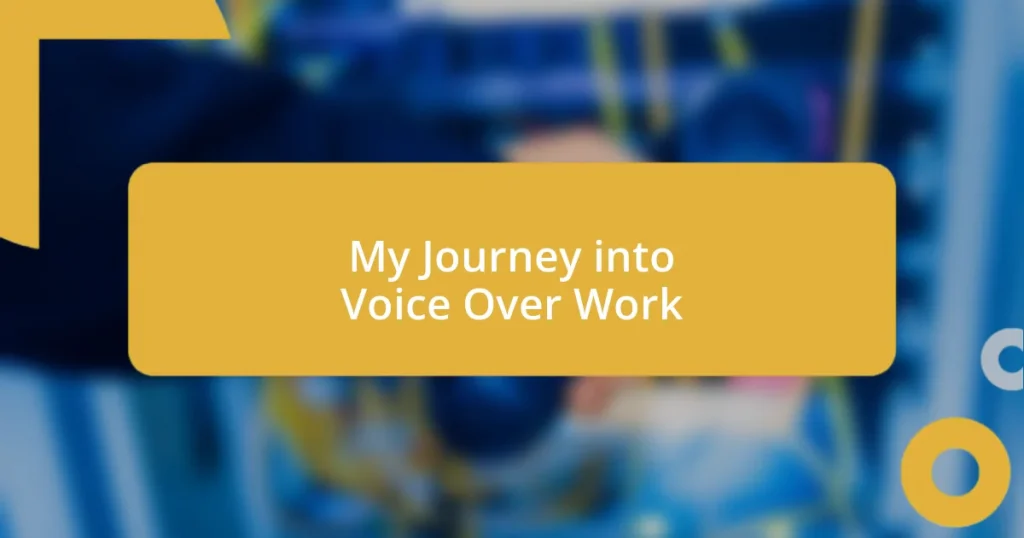Key takeaways:
- Preparation and understanding the audition process can help alleviate anxiety and allow performers to showcase their talent authentically.
- Selecting appropriate audition material that aligns with your vocal strengths and personality is crucial for a compelling performance.
- Reflecting on audition experiences and seeking feedback fosters growth, turning constructive criticism into valuable learning opportunities.
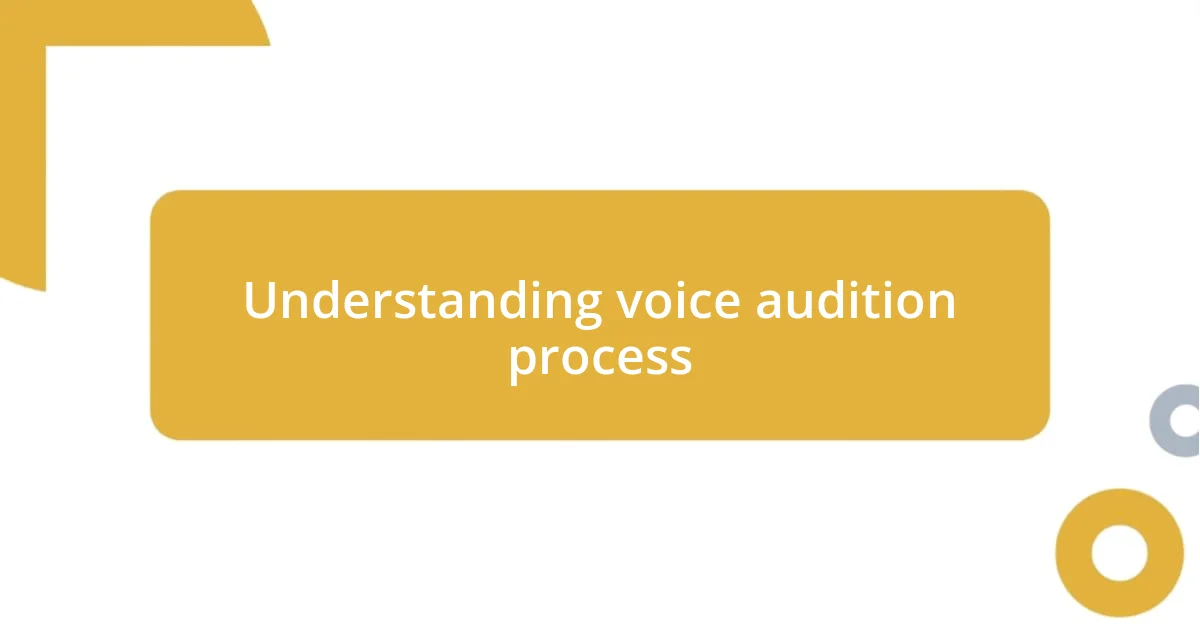
Understanding voice audition process
The voice audition process can feel a bit intimidating at first, but understanding it can empower you. I remember my first audition—it was a whirlwind of nerves and excitement. I didn’t fully grasp what to expect, and that uncertainty held me back. How can you truly showcase your talent if you’re overwhelmed with anxiety?
When you walk into an audition room, it’s more than just a performance; it’s an opportunity to connect. You’re not only showcasing your vocal skills but also your ability to interpret a piece and convey emotion. I vividly recall how one particular audition felt like a heart-to-heart with the panel. They weren’t just looking for a pretty voice; they wanted authenticity and passion. Have you ever felt that when performing? That moment when you lose yourself in the music?
Preparation is key, and knowing the structure of the audition process can ease your mind. Typically, you’ll face a panel of judges or casting directors who assess not only your vocal ability but also your personality and potential. I often remind myself that even if a panel seemed strict, they’re actually looking for someone to inspire them. So, how can we shift that pressure into performance fuel? It starts with understanding that auditions are a chance for mutual discovery; they’re looking for talent, and you’re looking for your next opportunity.
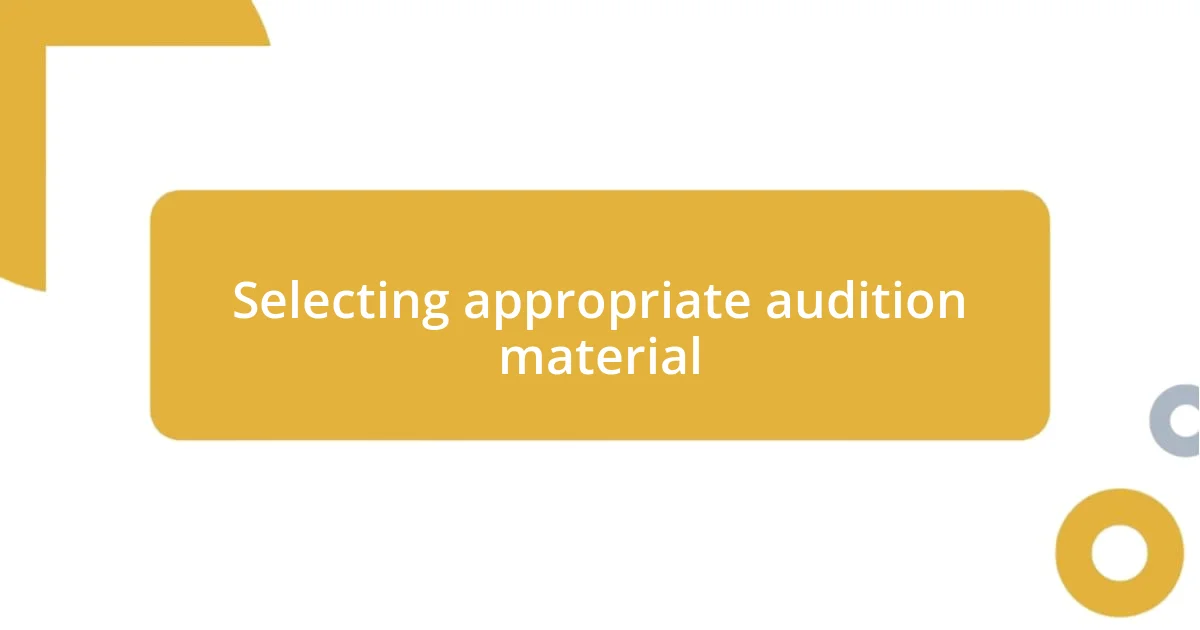
Selecting appropriate audition material
Selecting the right audition material can make or break your performance. I learned this the hard way during an early audition when I picked a song that wasn’t suited to my voice—it felt like trying to fit into a pair of shoes that were two sizes too small. It’s crucial to analyze your vocal range and choose pieces that reflect your strengths while also showcasing your unique style.
- Understand your vocal range: Choose material that complements your voice, not challenges it unnecessarily.
- Reflect your personality: Select songs or monologues that resonate with you; authenticity shines through.
- Consider the audition type: Different roles or productions may require specific genres or styles.
- Avoid overdone material: Strive for balance; choose something familiar yet fresh to stand out.
- Practice, practice, practice: Ensure you’re comfortable and can deliver the emotional depth required.
Once, I chose to sing a lesser-known ballad that really spoke to me, and that connection made all the difference. I found myself able to tell a story and draw the panel in, rather than just singing notes. That kind of synergy between the song and your voice can create a vibrant atmosphere and leave a lasting impression.
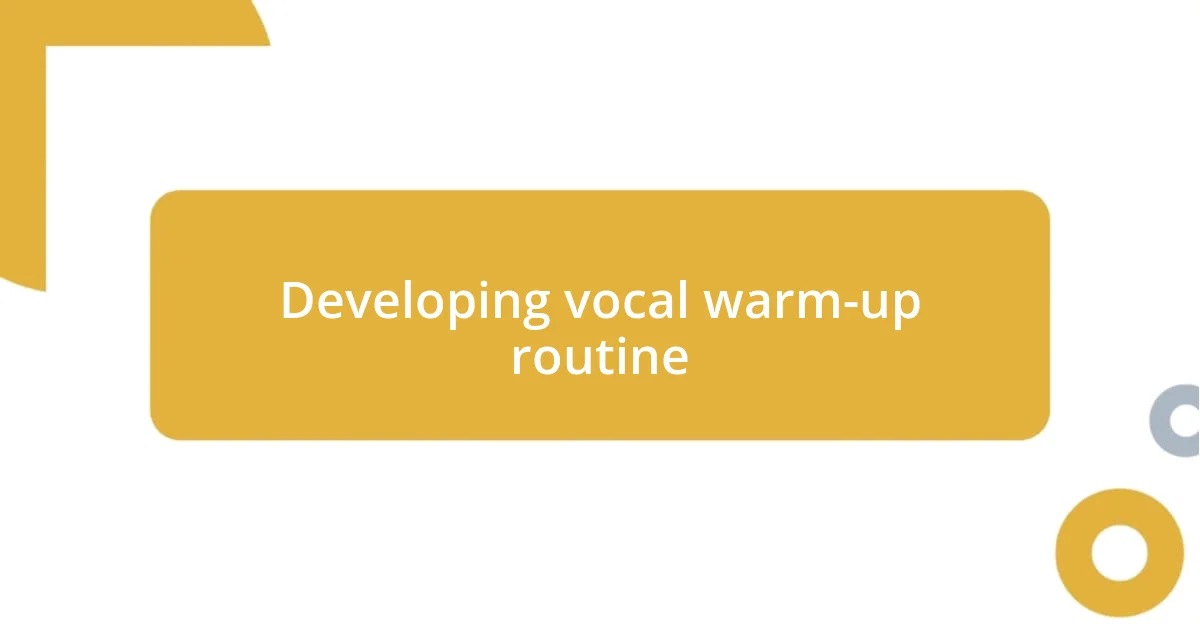
Developing vocal warm-up routine
Developing a solid vocal warm-up routine is essential for any singer preparing for an audition. I remember the first time I skipped my warm-ups; my voice felt tight, and the notes didn’t come out the way I hoped. It was a painful lesson. Now, I swear by a mix of breath control exercises and gentle sirens to ease into my vocal range. This helps stretch my vocal cords and prepares me mentally for the challenges ahead.
A comprehensive warm-up should include both physical and vocal components. I often incorporate light stretches and hums, as they really help activate my body and voice simultaneously. My favorite method? Starting with deep breathing exercises to ground myself, then moving to scales or arpeggios—this pacing allows my voice to transition from speaking to singing smoothly. Have you ever tried vocal slides? They’re fantastic for unlocking those higher notes without straining.
It’s beneficial to personalize your warm-up routine as you explore what works best for you. I’ve experimented over the years and found a combination that not only warms up my vocal cords but also calms my nerves. Creating a routine that resonates with your personal style and physical needs is key. Embrace the process and let your warm-up become a cherished part of your audition preparation!
| Warm-up Component | Purpose |
|---|---|
| Breath Control Exercises | Enhances lung capacity and control |
| Gentle Sirens | Stretches vocal cords and improves range |
| Light Physical Stretches | Relax the body and release tension |
| Humming | Warms up voice gently and slowly |
| Vocal Slides | Aids smooth transitions between notes |
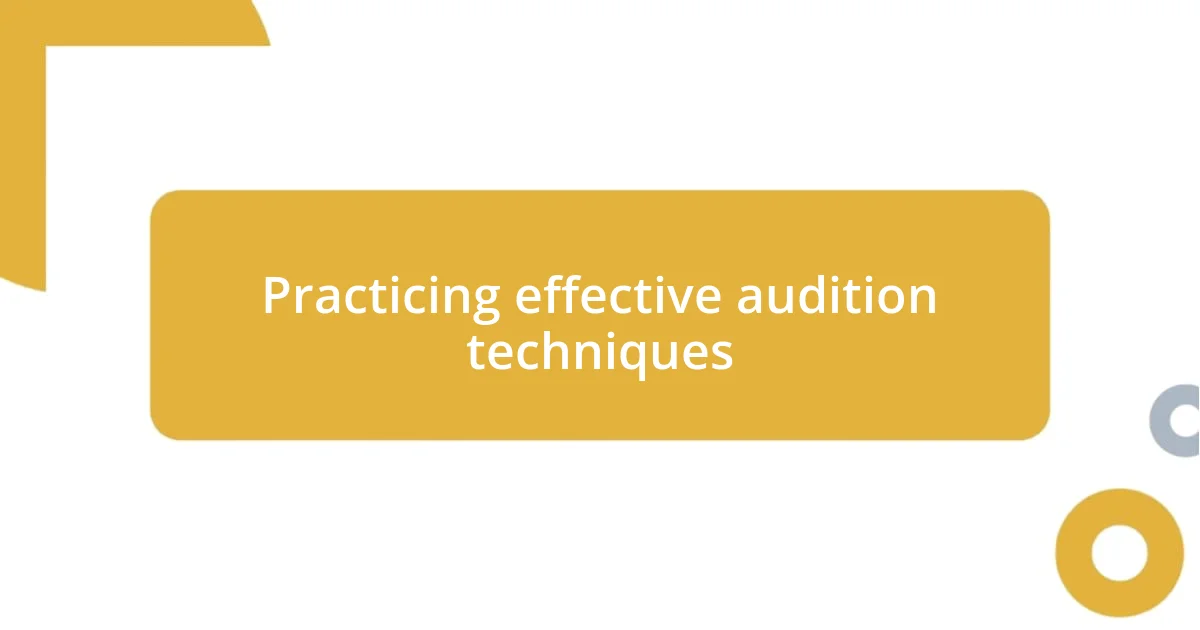
Practicing effective audition techniques
Practicing effective audition techniques is a game-changer for your performance. I vividly remember a time when I focused solely on memorizing my lines, neglecting the delivery. As I stood in front of the panel, my mind blanked out. It felt like I was reading from a script instead of bringing a character to life. Now, I make it a point to practice with intention, integrating emotion and physicality into my readings, so I can genuinely connect with the material.
One technique that has stuck with me is the art of visualization. Before stepping into an audition room, I close my eyes and picture the entire scene—the lighting, the audience, and even the reactions I hope to evoke. This mental rehearsal not only calms my nerves but also primes me for a more authentic performance. Have you ever felt butterflies before an audition? I’ve learned that embracing that energy, rather than succumbing to it, can elevate my performance to new heights.
Another key aspect is to seek feedback from peers or mentors. I recall after one particularly intense audition, I asked a fellow actor for their perspective; their insights opened my eyes to nuances of my performance I hadn’t considered. Constructive criticism is invaluable—it allows me to refine not just my vocal delivery but my overall approach. Remember, each audition is an opportunity to grow. How do you embrace feedback? For me, it’s about cultivating resilience and using every experience as a stepping stone to my next performance.
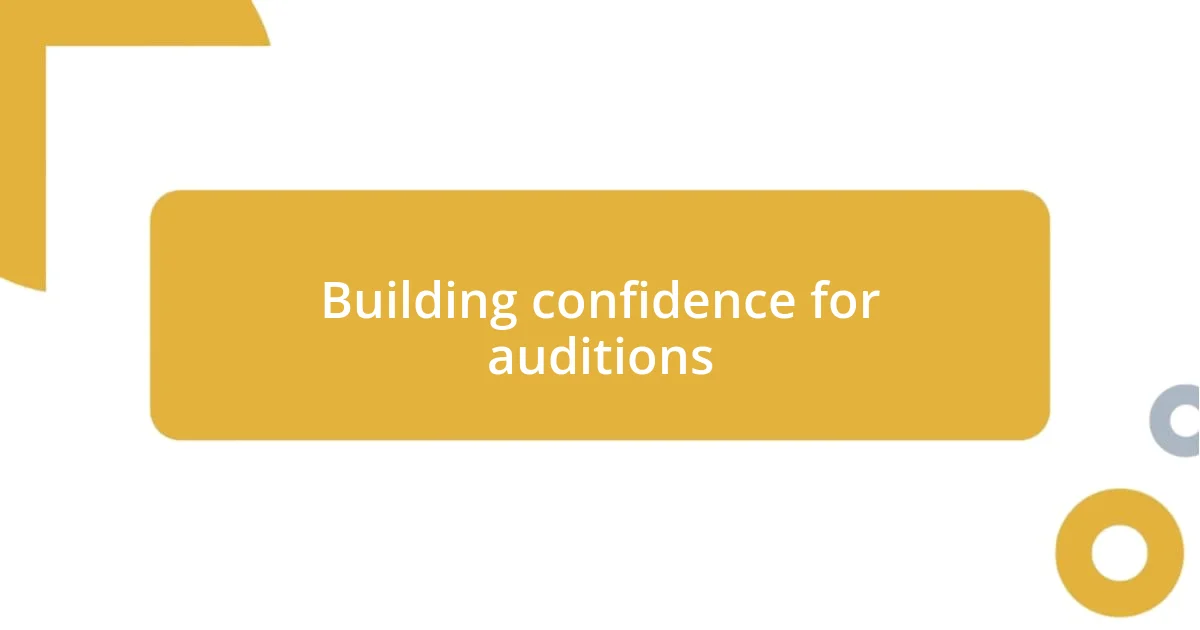
Building confidence for auditions
Building confidence for auditions is often an inner journey as much as it is about external preparation. I remember standing backstage before an important audition, feeling the weight of every expectation pressing down on me. In those moments, I discovered that positive self-talk became my secret weapon. Rather than letting fear breed doubt, I started repeating affirmations that reminded me of my strengths and past successes. Have you ever tried talking yourself through those jitters? It’s amazing how shifting your mindset can transform nervous energy into focused excitement.
Moreover, visualization plays a crucial role in my confidence-building routine. I vividly create a mental picture of myself walking onto the stage, owning every note and emotion like I’ve performed it a thousand times before. The power of this practice is that it prepares not just my voice, but my whole being. It’s like rehearsing before the main event. How do you see yourself during auditions? When you picture success instead of failure, you start to believe in it more deeply.
Lastly, I’ve found that connecting with fellow performers fosters a supportive environment where we can share fears and triumphs alike. I often remind myself that everyone in that room has faced their own struggles and has chosen to pursue this art out of love. Sharing these experiences with others not only reinforces my resolve but also bolsters our collective confidence. It’s empowering to realize you’re not alone. So, how do you build your community in this journey? Embracing the camaraderie of fellow artists has enriched my auditions tenfold, grounding me in shared determination and passion.
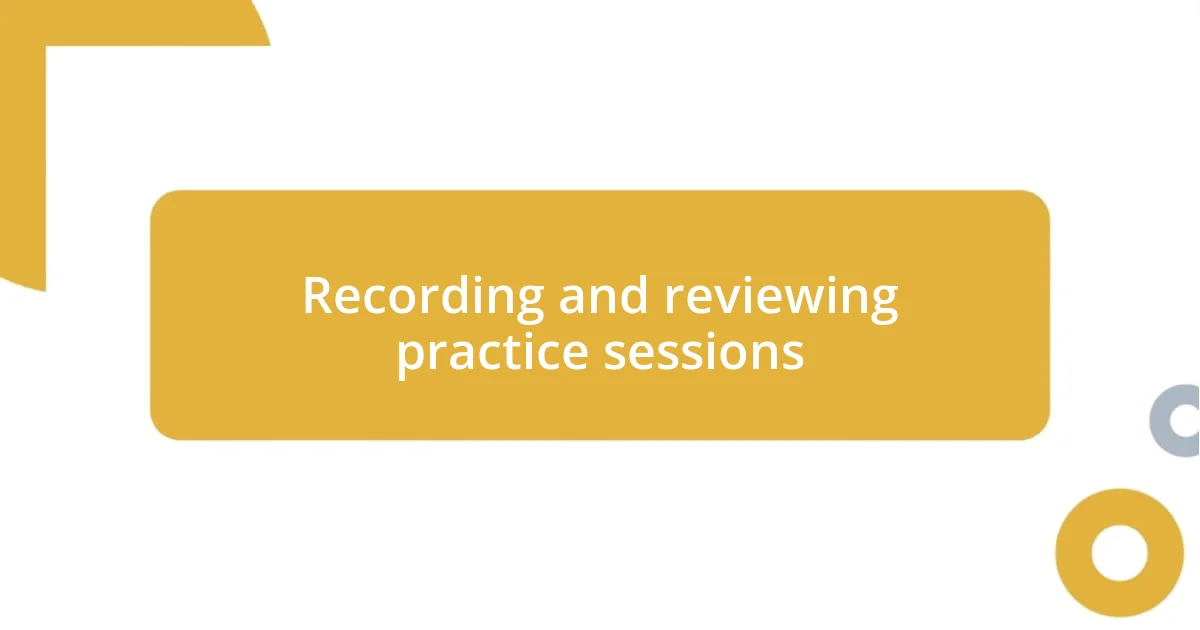
Recording and reviewing practice sessions
Recording my practice sessions has been a revelation in refining my craft. I remember the first time I listened to a playback; I was shocked by how different my voice sounded. It wasn’t just about pitch or tone, but the subtleties of my delivery that I hadn’t noticed while performing. Have you ever caught an habit you weren’t aware of? Listening to yourself can be an eye-opening experience, highlighting areas that need work and aspects that shine.
After recording, I dedicate time to review each session with a critical but open mind. I jot down notes on what worked well and what fell flat, creating a blueprint for improvement. One practice that I’ve found incredibly beneficial is isolating specific moments that felt off. I still recall picking apart a single phrase from a session where I felt disconnected. By dissecting what didn’t resonate, I could pinpoint the emotions I needed to channel for a stronger connection next time. This process not only strengthens my performance but helps me grow as a vocalist.
Ultimately, the magic happens not just in the recording but in how I use it. I’ve created playlists of my practice pieces over the years. Revisiting older recordings reminds me of my progress and fuels my desire to push further. It’s amusing how much I’ve evolved; sometimes, I laugh at my earlier attempts. But that’s part of the journey, isn’t it? How do you track your growth? For me, it’s a vibrant reminder that every note recorded contributes to the artist I’m continually becoming.
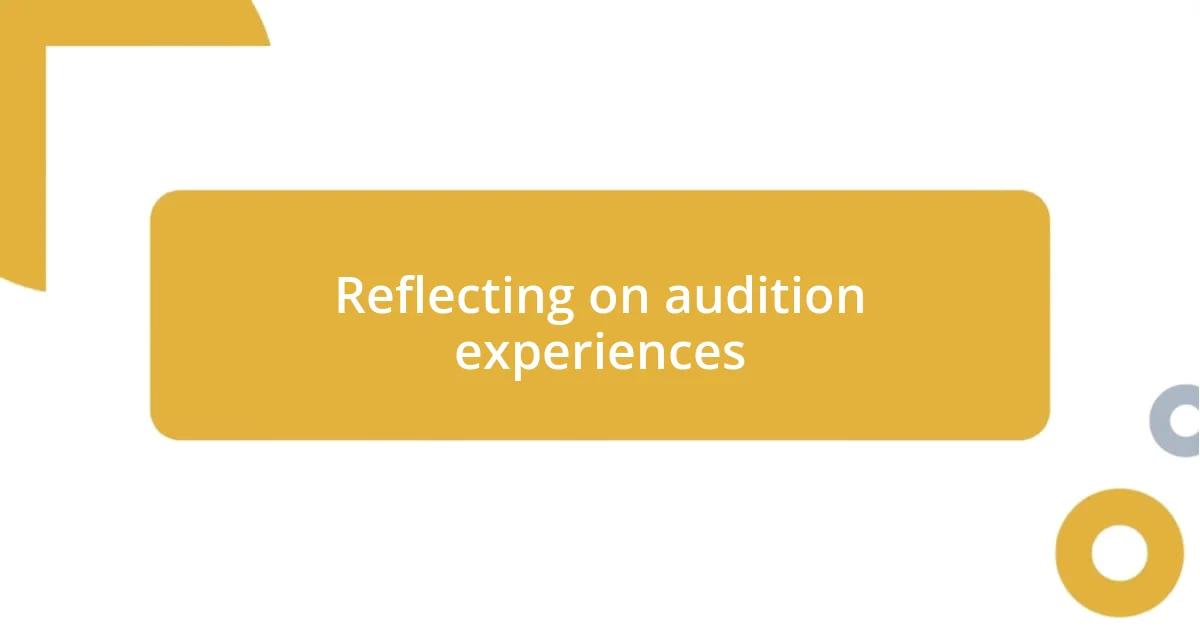
Reflecting on audition experiences
Reflecting on my audition experiences has become a valuable tool for growth. I often sit down after an audition, replaying moments in my mind—each nervous breath and every note’s inflection. It’s intriguing how just recalling the emotions I felt in those moments can provide clarity. Have you ever felt the adrenaline rush long after the audition doors have closed? I find myself remembering the exhilaration, highlighting why I keep coming back to the stage.
One audition stands out in particular. I walked into the room with so much self-doubt, yet I left with a newfound perspective. The feedback I received, even when it wasn’t what I hoped for, helped me see my performance’s strengths. Reflecting on this moment, I realized that growth often comes from discomfort. How do you handle constructive criticism? My take is that I embrace it as a stepping stone rather than a stumbling block.
I also make it a practice to journal my reflections after each audition. Writing down not only the outcomes but my feelings around them has been cathartic. I can look back and see patterns—what strategies worked, what didn’t, and how my emotional state played into my performance. Have you ever tucked away memories only to have them reemerge in a meaningful way? This habit reminds me of how far I’ve come, keeps my motivation alive, and serves as a compass pointing me toward future goals.










